If you are a gardener, you know the satisfaction that comes from seeing your efforts bear fruit in the form of flourishing plants with attractive blooms and tasty fruit. The enthusiasm, however, can quickly turn into a nightmare if unwanted insects or animals begin to infest your plants. One example of this would be the invasion of spiders into your garden plants and the indoor potted plants that you tend to so carefully. In this article, let’s take a closer look at spider eggs in plant soil and how to get rid of them!
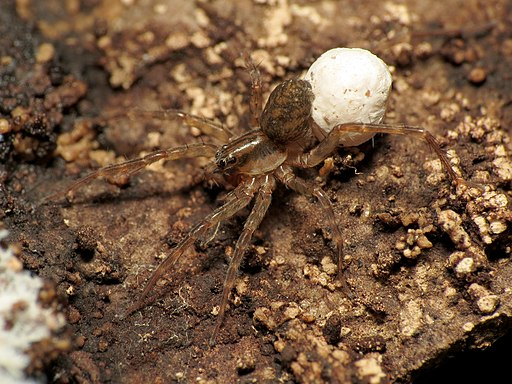
Spider eggs in plant soil indicate that these crawling insects may soon infest your lovely plants.
It is very difficult to see spider eggs in the soil with the human eye because of their yellow-brown hue and small size. However, if they are not taken care of in time, you will soon notice a legion of teeny-tiny spiders marching all over your garden and into your home.
Eggs laid by spiders in the ground can deplete the soil of moisture and nutrients using gelatinous, translucent shells. The absence of water and nutrients can have a negative impact on seedlings, leading to the development of weak plants.
So, how do you get rid of spider eggs from plant soil? Well, it is not hard!
If your plant can survive for a while without water, you can kill any spider eggs in the ground by letting the soil dry out. However, if you have plants that need to be irrigated constantly, you can use an imidacloprid-containing crystalline insecticide. Similarly, you also have the option to use Bacillus thuringiensis israelensis to kill spider eggs, which is toxic to spiders (but not humans or plants).
How To Identify Spider Eggs In The Soil?
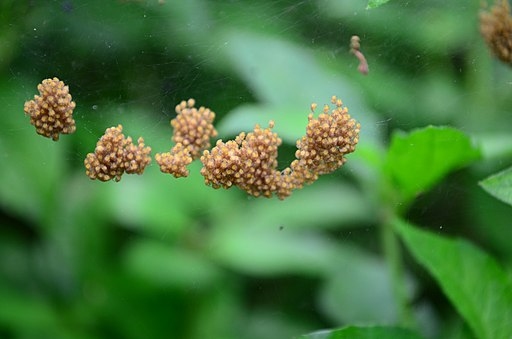
Most spider eggs are not laid in the open but rather in a silken egg sac.
Across all spider species, the eggs often appear as spherical, creamy white sacs. The problem is that these sacs are relatively small, making it tricky to locate the eggs.
However, thankfully, spiders lay many eggs, and these sacs tend to be clustered together. Here are some of the attributes you can rely on while looking for spider eggs.
Related: How To Get Rid Of Spider Mites For Good? A Comprehensive Guide
Pay Attention To The Shape And Texture
Eggs laid by spiders can be recognized mainly through their shape and the texture of their surface. Spider eggs are protected by egg sacs made of silk threads.
Although the form and consistency of the egg sac might differ from species to species, some similarities are mentioned below.
For instance, almost all spider eggs are:
- Globular
- Disc-shaped with a soft round center
- Soft and Moist
- Fluffy Silk Ball
- A round ball with spikes
Sac Size
Imagine a penny to put the size of the spider egg sac into perspective. A spider egg sac often has a similar proportion to the adult female spider that produced it. Some female spiders produce multiple tiny egg sacs, whereas others produce only one.
Color Of The Egg Sac
Egg sacs laid by spiders are typically white or slightly off-white in color. However, not all of the egg sacs of spiders are white. Spider egg sacs can also be brown, yellow, or yellowish-green in color. Sometimes they’re even golden. However, if the object is round, wet, pink, or black in color, it is most probably a spider egg sac.
Life Cycle Of Spiders
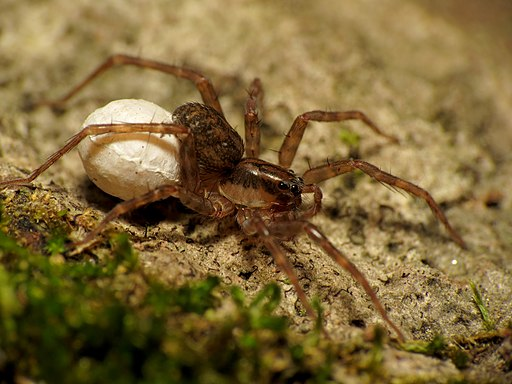
When it comes to spiders, everything occurs quickly and in a somewhat unpleasant way.
Spiders reproduce sexually, and females can lay up to 3000 eggs in one or more egg sacs, depending on the species. Their life-cycle consists of three stages: the egg stage, the spiderling stage, and the adult stage. Eggs can’t grow or mature without a constant supply of moisture and nutrients in their environment. It is because spiders spend most of their time as larvae within their own eggs.
When the eggs hatch, approximately two to three weeks later, little spiderlings are released into the environment that are identical copies of the mature adult stage. The typical lifespan of a spider is approximately two years. However, this can vary greatly depending on the species as well as the conditions in which it lives. Some species’ males have been known to live as long as ten years, while their females can live up to 35 years.
Damage Caused By Spider Eggs In The Soil
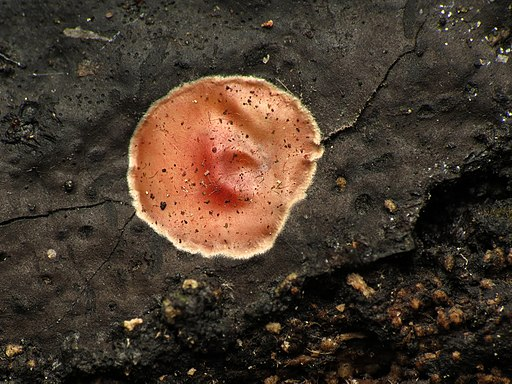
Spiders, much like other types of insects, can do a lot of damage to your plants.
The soil’s wetness and mineral composition make it an ideal home for spider eggs. Unfortunately, when spiders lay their eggs in the ground, they usually eat up all the water and nutrients the seeds need to sprout and stunt the growth of any nearby plants.
In addition, the presence of spider eggs in the soil promotes the growth of fungi, which can result in various diseases. Also, keep in mind that these eggs will not remain dormant in the ground for an indefinite amount of time; instead, they will hatch very soon. And, when that time comes, may the Lord protect your plants.
The spider eggs can hatch into hundreds of baby spiders that immediately begin destroying the roots and tender seedlings. As the spiderlings nibble on the roots, the roots become susceptible to root rot, a fungal disease. When this happens, the roots become waterlogged and brittle, and they are unable to properly absorb nutrients and water from the soil. As a direct consequence of this, seedlings quickly grow frail and pass away.
Related: Grass Spiders: How To Get Rid Of Them? A Comprehensive Guide
Prevent Spiders From Laying Eggs In The Soil
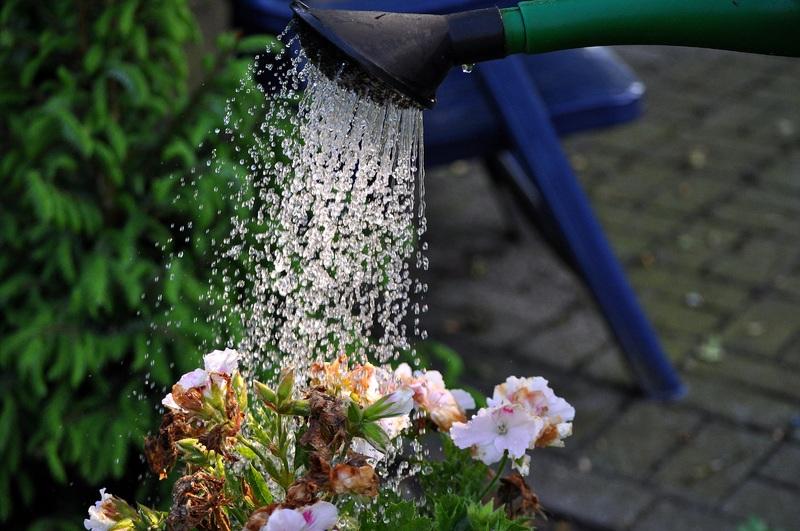
Do not overwater your plants since spiders love laying eggs in areas with moisture.
You’ve probably heard that care is always better than cure. So, if you can stop spiders from laying their eggs in the ground, you’ll save a lot of time and effort in the long run. And, it is not difficult! Here is how you can do it!
Do Not Over Water The Soil
If you water your plants more frequently than they require, moisture will accumulate in the soil. Therefore, you must wait between waterings in order to avoid it.
Also, it is best to water the plants first thing in the morning so that the surplus water can be evaporated by the heat of the sun during the day.
Spiders do not lay eggs in dry soil. If you water the plants in the evening, the extra water will remain in the ground and create moisture, attracting female spiders to lay eggs there. So, water the plants in the morning, and spiders will not be as attracted to the plants.
Remove Plant Debris
Plant detritus in the soil acts as a sponge, retaining moisture and creating an environment that is perfect for spiders to lay their eggs in. Therefore, it is critical to remove any dead plants from your lawn regularly to stop spiders from depositing eggs in the dirt there.
You can either use a vacuum to collect all of the fallen leaves that have accumulated below the plants, or you can use a broom to build a pile. Then with the assistance of a shovel, you can place all of the trash in a bag or a wheelbarrow and transport it to the compost area.
However, keep in mind that you shouldn’t compost the trash in your garden if any of your plants are affected or if the soil already contains spider eggs. It could spread the infestation or infection to the other plants.
Spraying Regularly With Pesticides
Spiders are exceptionally delicate insects. It is possible to keep the soil sterile and avoid many problems if you apply pesticides to it regularly. The use of pesticides to treat soil drives away a wide variety of insects, including spiders, and prevents them from establishing a nest and producing offspring in the area.
How To Get Rid Of Spider Eggs From The Soil?
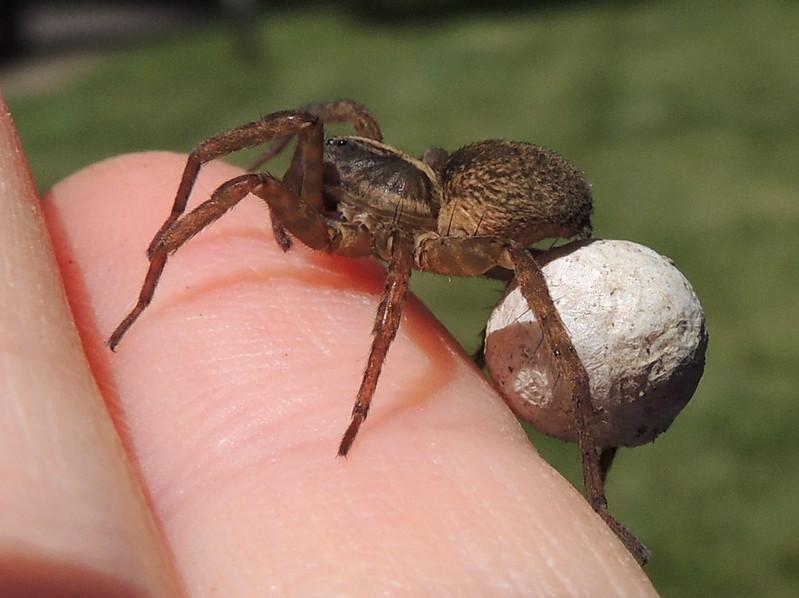
Spider-specific pesticides are a great way to eliminate spiders and their eggs from a garden.
Spiders are one of the oldest living creatures that can be found on our planet. They were miraculously protected from extinction by the significant events that had taken place during the history of our planet. So if you take every precaution and still find spider eggs in the soil of your lawn and potted plants, don’t be alarmed. Also, the good news is that you can still prevent spiders from taking over your house and yard. Following are some of the practices you can put into use to remove spider eggs from the soil.
Drying Out The Soil
There is just one reason spiders lay their eggs in the ground: the ground is damp. So if you find spider eggs in the soil, you must let them completely dry out.
If you dry the eggs, the shells will burst prematurely, and you won’t have any spiderlings in the soil after that. So, for a few days, stop watering the plants.
This will cause the surface layer of the soil, which is about an inch thick and where spider eggs are typically located, to become dry and brittle.
However, if you have plants that are highly dependent on water and cannot survive for a day without it, you can use any of the methods mentioned below.
Related: Russet Mites vs. Spider Mites: Their Differences and Management For Plant Good
Use Of Bacillus Thuringiensis Israelensis
You can also use BIT to get rid of spiders from your garden. However, it is essential to note that BTI kills spiderlings, not spider eggs. The action of BTI results in the death of spiderlings before they may mature into adults. You can introduce the BTI population into your garden using commercially available preparations. BTI-containing chemicals are often diluted with water before being sprayed on the ground.
Use Of Crystalline Pesticide On The Soil
There are formulas currently available on the market that target specific pests and their eggs, including spider eggs, in a precise manner. The soil in your houseplants can also safely be treated with these formulations. Imidacloprid is usually the active ingredient of these crystalline insecticides. Apply by sprinkling the crystalized imidacloprid onto the soil of your lawn and then watering it to activate the poison.
Imidacloprid causes the eggs to break, which results in the death of any premature spider larvae. It also gives the plant double the protection because the roots absorb it and eliminate spiders feeding on plant juices.
Spider-Specific Pesticides
Using a spider pesticide is yet another strategy you can employ to treat soil that is riddled with spider eggs. For instance, Web Out is a wonderful product that can be sprayed directly on spider eggs or cobwebs. However, to properly apply Web Out, first read the directions label on the bottle and proceed as recommended.
A 32-ounce bottle would be ideal for shower spraying. Concentrate your efforts on the soil where you found the spider eggs and the areas immediately surrounding them for the best possible outcomes. For example, one quart of Web Out is enough to treat an area of 300 square feet. After only a few minutes of spraying, the spider eggs and any other pests that may have been present in the soil will begin to dissolve.
Use Hydraulic Pressure To Get Rid Of Spider Eggs
This is not the most efficient or thorough method for removing spider eggs and spiders completely from your soil. However, if you have a hectic schedule and are short of time, utilizing this strategy intermittently will control the spider population.
Take a nozzle that looks like a jet, and then use it to give your soil a good soaking. Both the eggs and the larvae will be expelled from the ground.
The pressure may possibly injure or kill some of them. This is especially helpful if spider sacs are filled with eggs spread out across the surface. Just one jet stream is all it takes for these sacs to dissipate.
Use a Vacuum Cleaner
This is a cutting-edge approach to managing spiders in your garden. This method is particularly effective in situations where it is possible to recognize and locate eggs, larvae, and webs on the surface of the soil or within crevices in the ground.
Turn on your cleaner and point it towards the top layer of the soil while it is running. It won’t take long before it consumes everything. After that, you can dispose of everything as you see fit. However, you should know that this technique has several limitations.
For instance, this method will not destroy eggs and larvae buried deep in the earth.
Use Rubbing Alcohol
Killing potential spider eggs on the plant structure itself is something that needs to be done in addition to removing any eggs that may have been laid in the soil by spiders. This is when some rubbing alcohol can be quite useful.
You only need to take a cotton pad, soak it in any household alcohol, and then apply it to both sides of the plant leaves. 70% isopropyl alcohol is the one we prefer to use. It has never been unsuccessful in completing the task at hand.
Hydrogen Peroxide
You can kill spider mites and spiders, especially spider eggs, with peroxide, a very potent and widely accessible chemical. However, it should not be applied to the soil without first diluting it. Peroxide of 3% strength, filled to the top of a spray bottle, works best.
When it comes into contact with water, it produces a fizz that demolishes spider eggs and larvae. Additionally, it alters soil pH, rendering it uninhabitable for spiders and their eggs.
Use Insecticidal Soap
This is one of the most straightforward solutions for people who don’t want to use harsh pesticides on their indoor plants. Combine one teaspoon of insecticidal soap with one liter of water and mix thoroughly. This will produce a weak insecticidal solution.
Pour it directly over the soil while also spraying the plant. Regular application of this product will significantly reduce the number of spider eggs and spider mites on your property.
Use Biological Control
You can get rid of the teeny-tiny white eggs in houseplants’ soil by introducing certain pests. For example, in nature, spiders are vulnerable to attack from predators such as lacewings, ladybugs, and even other species of spiders.
You can get them from the farmer’s market near you or place an order for them online. Remove everything from the soil that can make it harder for these unwanted organisms to grow and survive before you put them there. This includes an excessive amount of mulch, fallen leaves, and flowers.
What are the advantages of using this approach? Your plant will remain healthy, and there will be no discernible adverse effects. It also helps to protect against spider infestations in the future, which is a significant benefit.
Use Neem Oil
Neem oil is a remarkable substance that can be used to eliminate a wide variety of insects that are harmful to plants. It is effective against all of them, regardless of whether the pests in question are spiders, fungus gnats, or something else entirely.
Compared to insecticides based on chemicals, it is also better for the plant’s health. This oil is effective because it breaks the reproduction cycle of the eggs in your soil. The eggs will not develop into larvae because they will not hatch.
Conclusion
Spiders are definitely not on the list of my favorite species; it’s more accurate to say that they’re probably on the list of creatures I despise. Plants grown in soil suspected of harboring spider eggs should be inspected often for the presence of either eggs or spiderlings. You will probably need a magnifying lens to see spider eggs in plant soil.
Nevertheless, it is critical to identify them in a timely manner in order to prevent a major insect infestation. The presence of spider eggs in plant soil poses a possible threat to the health of both people and plants. If you have reason to believe that your soil contains spider eggs, getting rid of them before the youngsters emerge is preferable.
Eliminating spider eggs can be accomplished in a variety of ways. You have the option of using either organic or chemical processes. Your plant needs to be saved, so make sure that whatever option you pick, you do it quickly. If you are unsure that the plant will recover, I recommend contacting pest control.
Frequently Asked Questions (FAQs)
How do I get rid of spiders in my soil?
There are many ways you can get rid of spiders and their eggs from the soil in your garden. For instance, the use of insecticidal soap is an effective method for removing spiders and spider eggs from plants, whether they are kept indoors or outdoors. However, if the infestation is on a large scale, you might need to use harsh chemicals.
Can you pick up spider eggs?
You can pick up spider eggs with your hands. First, drape a medium-sized bag over one hand to cover it loosely. Then, grab the egg sac slowly with the same hand. Since spider eggs are delicate, they can also be retrieved with a broom or vacuum. After each vacuuming, remove the bag and seal the trash and eggs in a plastic bag.
Where are spider eggs located?
In several species, the females prepare the egg sac for abandonment by mounting it on a stalk, fastening it to a stone, or wrapping it in silk. Spiders frequently attach their egg sacs to convert locations to protect the eggs. Egg sacs from spiders may be attached to the underside or backs of furniture.
Can I squish a spider egg sac?
As soon as you see a spider egg sac in a web or attached to a female spider, remove it immediately. These sacs can hold hundreds of eggs, which can hatch two to three weeks after they are laid. Also, be careful not to squash or rupture the sac because doing so can spill its contents all over the place.
Do spiders abandon their eggs?
Once a spider’s eggs are fertilized, they must be protected from predators until the spiderlings hatch. So, certain species of spiders will encase their eggs in a silken pouch and then abandon them, while other species will remain with their eggs until they hatch.
How many eggs do spiders lay at once?
Spider species that frequently invade homes can lay hundreds of eggs all at once. For instance, an egg sac may contain over 200 eggs. An approximate range would be 2 to 1,000 eggs, and some spiders have been known to lay up to 20 egg sacs in their lifetime.
Can spiders lay eggs without mating?
Even if they haven’t found a suitable mate, adult female tarantulas and spiders can deposit eggs. However, there is a good chance that these eggs will not be fertilized.
But, this is not always the case. For example, after successfully mating with a male, tarantulas and spiders can retain sperm for several months.
Sources for Further Reading
UNE: Living Soils: The Underworld Invertebrate animals: Spiders. (2022). Retrieved 7 September 2022, from https://openlearning.une.edu.au/LivingSoils/index.php?u=module01/spider.htm
Eliminating Spiders Around Homes and Buildings | Entomology. (2022). Retrieved 7 September 2022, from https://entomology.ca.uky.edu/ef623
Common Spiders in and Around Homes. Retrieved 7 September 2022, from https://store.extension.iastate.edu/product/Common-Spiders-in-and-Around-Homes
Editor’s Recommendations
Best Worms For Composting: Its Basics and Guide for Beginners!
What Do Caterpillars Eat? Top 3 Host Plants You Must Know!
Black Beetles 101: Types and A Comprehensive Identification Guide with Pictures







